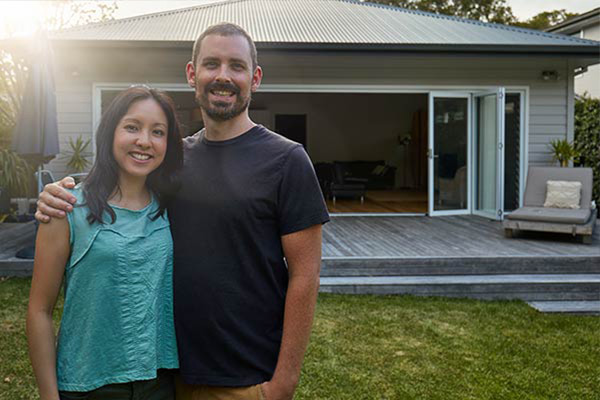How Much House Can I Afford?
Wondering “How much house can I afford?” You’re not alone. Buying a home is likely the largest financial investment you’ll make. You want to find a great spot that you can comfortably grow into and enjoy for years to come, but you also don’t want to end up spending more than you can comfortably afford to pay.
Making such a big financial move can feel daunting, but it doesn’t have to be. This simple guide can help you determine your home affordability.
How Much House Can I Afford?
There’s a lot more to home affordability than the asking price on your dream home. Before you make an offer, you want to consider if you can comfortably afford the overall price of the home and make monthly mortgage payments.
Home Affordability Calculator
Before you start home shopping, it is a good idea to get a sense of your overall price range so you can feel comfortable knowing you aren’t taking on a home—or a mortgage—that will leave you cash strapped. Here’s what to consider:
Annual Income
Calculate your post-tax income—as well as any income from your co-borrower.
Total Monthly Debts
Calculate all of your monthly financial obligations outside of your mortgage payment. Most experts recommend your debt-to-income ratio, calculated by dividing the sum of your debts by your gross monthly income, not exceed 36%. Your DTI should include your debts, expenses, and potential mortgage payment.
Down Payment
How much do you have saved to put toward a down payment? While you can get a conventional loan for as low as 3% down, most experts recommend aiming for 20% down. The more you can pay upfront for a home, the less you’ll pay overtime.
Closing Costs
Closing costs range from 2 to 5% of the total price of the home, paid upfront.
Figuring it all out can feel overwhelming. Thankfully, a home affordability calculator can do the work for you.
Mortgage Affordability Calculator
Beyond knowing what home you can afford, you’ll also want to make sure you can comfortably afford the monthly mortgage payment without sacrificing your lifestyle. Mortgage payments typically include much of the monthly cost of homeownership such as payments toward your principle and interest, insurance costs, and property taxes. Here’s what to consider:
Home Price
The estimated price of your home, taken from your own calculations or a home affordability calculator.
Down Payment
How much you can afford to put down will lower the overall cost of your mortgage.
Loan Term
Many buyers opt for a 30-year loan, but you can get a shorter loan term. Your mortgage will be spread over your loan term.
Interest Rate
Interest rates change daily. Many mortgage affordability calculators calculate current rates for you. You can also pre-qualify for a mortgage to see what rate you might be eligible for without impacting your credit score.
Property Taxes
Your local tax assessor’s website can help you estimate property taxes.
Homeowners Insurance
Homeowners insurance costs vary widely by state and local. Though, on average, you could pay at least $35 per month per 100,000 spent on a home.
Specialty Insurance
If you live in an area prone to flooding, high winds, or earthquakes, plan on paying for extended insurance coverage.
Homeowner Association Dues
If you’re considering a neighborhood with a HOA, factor those costs in.
Private Mortgage Insurance
If you put less than 20% down on a home, you may have to pay for private mortgage insurance. PMI (or mortgage insurance premium for Federal Housing Administration-backed loans) is often required until you pay down some of the principle of your home and build equity.
The mortgage affordability calculator below can do the calculations for you and help you estimate some costs.
How Much Mortgage Can I Qualify For?
Another factor to consider in home affordability is what kind of mortgage you qualify for. Mortgage lenders will look at several factors when deciding what loan amounts and loan terms to offer you:
Your Income
Lenders will want to verify your—and any coborrower’s—income to determine you can make payments. You’ll need to provide paystubs or tax returns.
Your Credit Score
You credit score plays a big factor in how much you can borrow for a mortgage. Generally, the higher the credit score the better, but some types of mortgages—like FHA loans—can work for homebuyers with less than perfect credit.
Your DTI
Much like you calculated when deciding your home affordability, lenders look at your DTI. Typically, lenders look to see if you have a debt-to-income ratio at or below 43%—though some lenders may go up to 50%.
Your Cash Reserves
Lenders will want to verify that you have the cash on hand to make a down payment and afford your closing costs while leaving yourself a cushion of cash reserves.
When you’re ready to shop for a home, your lender will calculate all of your unique factors and offer you an interest rate and loan amount in the form, known as a pre-qualification. Your terms are good for 30 days, so you can shop for a home with confidence.Buying a home is a big deal, but once you know what your home affordability is, all you have left to worry about is finding your dream pad.
Quicken has made the material on this blog available for informational purposes only. Use of this website constitutes agreement to our Terms of Use and Privacy Policy. Quicken does not offer advisory or brokerage services, does not recommend the purchase or sale of any particular securities or other investments, and does not offer tax advice. For any such advice, please consult a professional.



